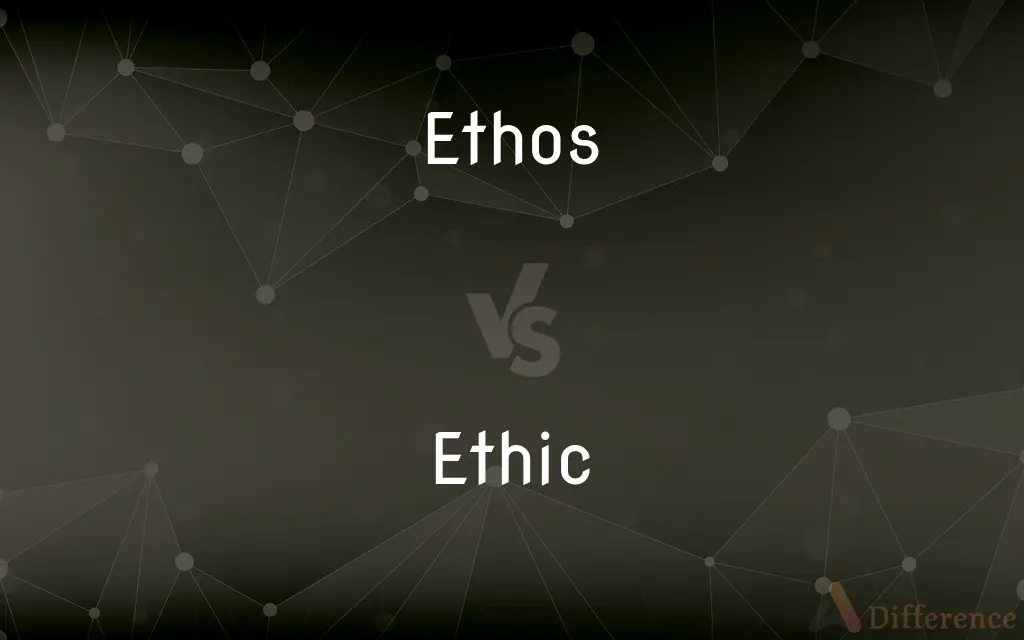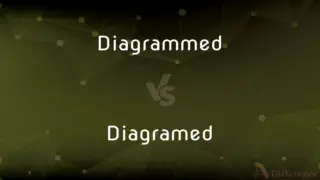Ethos vs. Ethic — What's the Difference?
By Tayyaba Rehman & Fiza Rafique — Updated on September 11, 2023
"Ethos" refers to the characteristic spirit or values of a community, culture, or organization, while "Ethic" usually pertains to a specific moral principle or set of principles guiding individual behavior.

Difference Between Ethos and Ethic
Table of Contents
ADVERTISEMENT
Key Differences
"Ethos" is generally understood as the collective character or values that define a group, community, or culture. "Ethic," in contrast, is typically concerned with a specific moral guideline or code of conduct that governs individual or group behavior.
While "ethos" serves as a broader term, often embracing a range of beliefs, customs, and practices that shape a particular community or group, "ethic" is usually narrower, focusing on particular moral principles such as honesty, integrity, or fairness.
In terms of grammatical usage, "ethos" is primarily a singular noun that seldom changes form. "Ethic" can be both a singular and a plural noun ("ethics"), depending on whether it's referring to one moral principle or a set of moral principles.
Both "ethos" and "ethic" originate from Greek, but they serve different roles in language and philosophy. "Ethos" is used more in discussions of culture, branding, and collective identity, while "ethic" appears more frequently in discussions of morality, law, and individual choice.
While both terms can be used to talk about values or principles, the focus and scope differ: "ethos" is more about collective belief systems, and "ethic" is more about individual or specific moral guidelines.
ADVERTISEMENT
Comparison Chart
Meaning
Characteristic spirit of a community
Specific moral principle
Scope
Broad, collective
Narrow, individual
Grammatical
Primarily a singular noun
Singular and plural ("ethics")
Usage
Culture, branding, collective identity
Morality, law, individual choice
Origin
Greek
Greek
Compare with Definitions
Ethos
The collective character of a community.
The ethos of the organization is based on teamwork.
Ethic
A principle governing good and bad behavior.
His strong work ethic is admired by his peers.
Ethos
An environment that emanates a particular spirit or culture.
The city's ethos of innovation attracted tech startups.
Ethic
A system of moral values.
The ethic of fairness is central to the judicial system.
Ethos
A form of rhetoric where the character or credibility of the speaker influences the audience.
Her ethos as a seasoned entrepreneur made the pitch more compelling.
Ethic
A set of principles of right and wrong.
Following an ethic of honesty is essential in journalism.
Ethos
The moral disposition introduced by a speaker or author in an argument.
His ethos as a trustworthy scientist helped validate his argument.
Ethic
Moral character or nature.
His ethic makes him a reliable friend.
Ethos
The guiding values of a person, group, or organization.
The school's ethos is rooted in academic excellence.
Ethic
The study of moral values and rules.
He is studying ethic as part of his philosophy course.
Ethos
Ethos ( or US: ) is a Greek word meaning "character" that is used to describe the guiding beliefs or ideals that characterize a community, nation, or ideology. The Greeks also used this word to refer to the power of music to influence emotions, behaviors, and even morals.
Ethic
A set of moral principles, especially ones relating to or affirming a specified group, field, or form of conduct
The puritan ethic was being replaced by the hedonist ethic
Ethos
The characteristic spirit of a culture, era, or community as manifested in its attitudes and aspirations
A challenge to the ethos of the 1960s
Ethic
Relating to moral principles or the branch of knowledge dealing with these
The ethic question is of wider import
Ethos
The disposition, character, or fundamental values peculiar to a specific person, people, culture, or movement
"They cultivated a subversive alternative ethos" (Anthony Burgess).
Ethic
A set of principles of right conduct.
Ethos
The character or fundamental values of a person, people, culture, or movement.
Ethic
A theory or a system of moral values
"An ethic of service is at war with a craving for gain" (Gregg Easterbrook).
Ethos
(rhetoric) A form of rhetoric in which the writer or speaker invokes their authority, competence or expertise in an attempt to persuade others that their view is correct.
Ethic
Ethics (used with a sing. verb) The study of the general nature of morals and of the specific moral choices to be made by a person; moral philosophy.
Ethos
(aesthetics) The traits in a work of art which express the ideal or typic character, as influenced by the ethos (character or fundamental values) of a people, rather than realistic or emotional situations or individual character in a narrow sense; opposed to pathos.
Ethic
Ethics (used with a sing. or pl. verb) The rules or standards governing the conduct of a person or the members of a profession
Medical ethics.
Ethos
The character, sentiment, or disposition of a community or people, considered as a natural endowment; the spirit which actuates manners and customs; also, the characteristic tone or genius of an institution or social organization.
Ethic
Moral, relating to morals.
Ethos
The traits in a work of art which express the ideal or typic character - character as influenced by the ethos (sense 1) of a people - rather than realistic or emotional situations or individual character in a narrow sense; - opposed to pathos.
Ethic
A set of principles of right and wrong behaviour guiding, or representative of, a specific culture, society, group, or individual.
The Protestant work ethic.
I think the golden rule is a great ethic.
Ethos
(anthropology) the distinctive spirit of a culture or an era;
The Greek ethos
Ethic
The morality of an action. en
Ethic
Of, or belonging to, morals; treating of the moral feelings or duties; containing percepts of morality; moral; as, ethic discourses or epistles; an ethical system; ethical philosophy.
The ethical meaning of the miracles.
Ethic
The principles of right and wrong that are accepted by an individual or a social group; as, the Puritan ethic.
Ethic
A system of principles governing morality and acceptable conduct.
Ethic
The principles of right and wrong that are accepted by an individual or a social group;
The Puritan ethic
A person with old-fashioned values
Ethic
A system of principles governing morality and acceptable conduct
Common Curiosities
Can Ethic be plural?
Yes, it can be "ethics" when referring to a set of moral principles.
Is Ethos the same as Ethic?
No, Ethos is about collective values, while Ethic is about individual moral principles.
What does Ethos mean?
Ethos refers to the characteristic values or spirit of a community or group.
What is the focus of Ethic?
The focus is usually on specific moral principles like honesty or fairness.
Is Ethic used in law?
Yes, legal ethics guide the behavior of legal professionals.
What does Ethic mean?
Ethic refers to specific moral principles guiding individual or group behavior.
Is Ethos ever plural?
Rarely, it's almost always used as a singular noun.
Where does the word Ethos come from?
It comes from Greek, meaning character or custom.
Is Ethos related to ethics?
They're related but not synonymous; Ethos is broader, covering collective beliefs.
How is Ethos used in rhetoric?
Ethos can refer to the credibility or moral character of a speaker.
Can Ethos relate to a company?
Yes, companies often have a corporate ethos that defines their culture.
Where does the word Ethic come from?
It also comes from Greek, related to morality.
How do you use Ethos in a sentence?
"The ethos of the school promotes academic excellence."
How do you use Ethic in a sentence?
"She has a strong work ethic."
Can Ethic relate to professional behavior?
Yes, professions often have a code of ethics to guide behavior.
Share Your Discovery

Previous Comparison
Diagrammed vs. Diagramed
Next Comparison
Gravida vs. ParaAuthor Spotlight
Written by
Tayyaba RehmanTayyaba Rehman is a distinguished writer, currently serving as a primary contributor to askdifference.com. As a researcher in semantics and etymology, Tayyaba's passion for the complexity of languages and their distinctions has found a perfect home on the platform. Tayyaba delves into the intricacies of language, distinguishing between commonly confused words and phrases, thereby providing clarity for readers worldwide.
Co-written by
Fiza RafiqueFiza Rafique is a skilled content writer at AskDifference.com, where she meticulously refines and enhances written pieces. Drawing from her vast editorial expertise, Fiza ensures clarity, accuracy, and precision in every article. Passionate about language, she continually seeks to elevate the quality of content for readers worldwide.













































